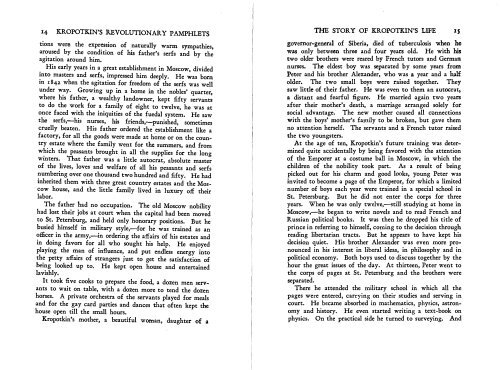Kropotkin's Revolutionary Pamphlets - Libcom
Kropotkin's Revolutionary Pamphlets - Libcom
Kropotkin's Revolutionary Pamphlets - Libcom
You also want an ePaper? Increase the reach of your titles
YUMPU automatically turns print PDFs into web optimized ePapers that Google loves.
I4 KROPOTKIN'S REVOLUTIONARY PAMPHLETS<br />
THE STORY OF KROPOTKIN'S LIFE<br />
IS<br />
dons were the expr <br />
ion of naturally warm sympathies,<br />
aroused by the condItIOn of his father's serfs and by the<br />
agitation around him.<br />
His early years in a great establishment in Moscow divided<br />
nto masters and serfs, impressed him deeply. He ;as born<br />
m 1842 when the agitation for freedom of the serfs was well<br />
under way. Growing up in a home in the nobles' quarter<br />
where his father, a wealthy landowner, kept fifty servant:<br />
to do the work for a family of eight to twelve, he was at<br />
once faced with the iniquities of the fuedal system. He saw<br />
the serfs,-his nurses, his friends,-punished, sometimes<br />
cruelly beaten. His father ordered the establishment like a<br />
factory, for all the goods were made at home or on the country<br />
estate where the family went for the summers and from<br />
w?ich the peasants brought in all the supplies f;r the long<br />
winters. That father was a little autocrat, absolute master<br />
of the lives, loves and welfare of all his peasants and serfs<br />
numbering over one thousand two hundred and fifty. He had<br />
inherited them with three great country estates and the Moscow<br />
house, and the little family lived in luxury off their<br />
labor.<br />
The fath <br />
r ad no occupation. The old Moscow nobility<br />
had lost their Jobs at court when the capital had been moved<br />
to St. Petersburg, and held only honorary positions. But he<br />
busied himself in military style,-for he was trained as an<br />
officer in the army,-in ordering the affairs of his estates and<br />
in oing favors for <br />
ll who sought his help. He enjoyed<br />
playmg the man of mfluence, and put endless energy into<br />
the petty affairs of strangers just to get the satisfaction of<br />
being looked up to. He kept open house and entertained<br />
lavishly.<br />
It took five cooks to prepare the food, a dozen men servants<br />
to wait on table, with a dozen more to tend the dozen<br />
horses. A private orchestra of the servants played for meals<br />
and for the gay card parties and dances that often kept the<br />
house open till the small hours.<br />
<strong>Kropotkin's</strong> mother, a beautiful woman, daughter of a<br />
governor-general of Siberia, died of tuberculosis when he<br />
was only between three and four years old. He with his<br />
two older brothers were reared by French tutors and German<br />
nurses. The eldest boy was separated by some years from<br />
Peter and his brother Alexander, who was a year and a half<br />
older. The two small boys were raised together. They<br />
saw little of their father. He was even to them an autocrat,<br />
a distant and fearful figure.<br />
He married again two years<br />
after their mother's death, a marriage arranged solely for<br />
social advantage. The new mother caused all cennections<br />
with the boys' mother's family to be broken, but gave them<br />
no attention herself. The servants and a French tutor raised<br />
the two youngsters.<br />
At the age of ten, <strong>Kropotkin's</strong> future training was determined<br />
quite accidentally by being favored with the attention<br />
of the Emporer at a costume ball in Moscow, in which the<br />
children of the nobility took part. As a result of being<br />
picked out for his charm and good looks, young Peter was<br />
invited to become a page of the Emperor, for which a limited<br />
number of boys each year were trained in a special school in<br />
St. Petersburg. But he did not enter the corps for three<br />
years. When he was only twelve,--8till studying at home in<br />
Moscow,-he began to write novels and to read French and<br />
Russian political books. It Was then he dropped his title of<br />
prince in referring to himself, coming to the decision through<br />
reading libertarian tracts. But he appears to have kept his<br />
decision quiet. His brother Alexander was even more pronounced<br />
in his interest in liberal ideas, in philosophy and in<br />
political economy. Both boys used to discuss together by the<br />
hour the great issues of the day. At thirteen, Peter Went to<br />
the corps of pages at St. Petersburg and the brothers were<br />
separated.<br />
There he attended the military school in which all the<br />
pages were entered, carrying on their studies and serving in<br />
court. He became absorbed in mathematics, physics, astronomy·<br />
and history. He even started writing a text-book on<br />
physics. On the practical side he turned to surveying. And

















